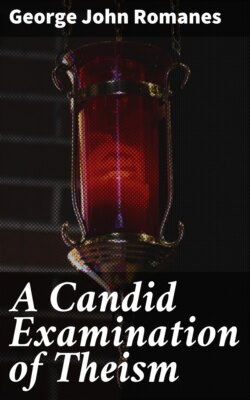Читать книгу A Candid Examination of Theism - George John Romanes - Страница 8
На сайте Литреса книга снята с продажи.
THE ARGUMENT FROM THE EXISTENCE OF THE HUMAN MIND.
Оглавление8. Introductory.
9. Examination of the Argument, and the independent coincidence of my views regarding it with those of Mr. Mill.
10. Locke's exposition of the Argument, and a re-enunciation of it in the form of a Syllogism.
11. The Syllogism defective in that it cannot explain Mind in the abstract. Mill quoted and answered. This defect in the Syllogism clearly defined.
12. The Syllogism further defective, in that it assumes Intelligence to be the only possible cause of Intelligence. This assumption amounts to begging the whole question as to the being of a God. Inconceivability of Matter thinking no proof that it may not think. Locke himself strangely concedes this. His fallacies and self-contradictions pointed out in an Appendix.
13. Objector to the Syllogism need not be a Materialist, but assuming that he is one, he is as much entitled to the hypothesis that Matter thinks as a Theist is to his hypothesis that it does not.
14. The two hypotheses are thus of exactly equivalent value, save that while Theism is arbitrary, Materialism has a certain basis of fact to rest upon. This basis defined in a footnote, where also Professor Clifford's essay on "Body and Mind" is briefly examined. Difficulty of estimating the worth of the Argument as to the most conceivable being most likely true.
15. Locke's comparison between certainty of the Inconceivability Argument as applied to Theism and to mathematics shown to contain a virtual though not a formal fallacy.
16. Summary of considerations as to the value of this Argument from Inconceivability.
17. Introductory to the other Arguments in favour of the conclusion that only Intelligence can have caused Intelligence.
18. Locke's presentation of the view that the cause must contain all that is contained in the effects. His statements contradicted. Mill quoted to show that the analogy of Nature is against the doctrine of higher perfections never growing out of lower ones.
19. Enunciation of the last of the Arguments in favour of the proposition that only Intelligence can cause Intelligence. Hamilton quoted to show that in his philosophy the entire question as to the being of a God hinges upon that as to whether or not human volitions are caused.
20. Absurdity of the old theory of Free-will. Hamilton erroneously identified this theory with the fact that we possess a moral sense. His resulting dilemma.
21. Although Hamilton was wrong in thus identifying genuine fact with spurious theory, yet his Argument from the fact of our having a moral sense remains to be considered.
22. The question here is merely as to whether or not the presence of the moral sense can be explained by natural causes. A priori probability of the moral sense having been evolved. A posteriori confirmation supplied by Utilitarianism, &c.
23. Mill's presentation of the Argument a resuscitation of Paley's. His criticism on Paley shown to be unfair.
24. The real fallacy of Paley's presentation pointed out.
25. The same fallacy pointed out in another way.
26. Paley's typical case quoted and examined, in order to illustrate the root fallacy of his Argument from Design. Mill's observations upon this Argument criticised.
27. Result yielded by the present analysis of the Argument from Design. The Argument shown to be a petitio principii.
